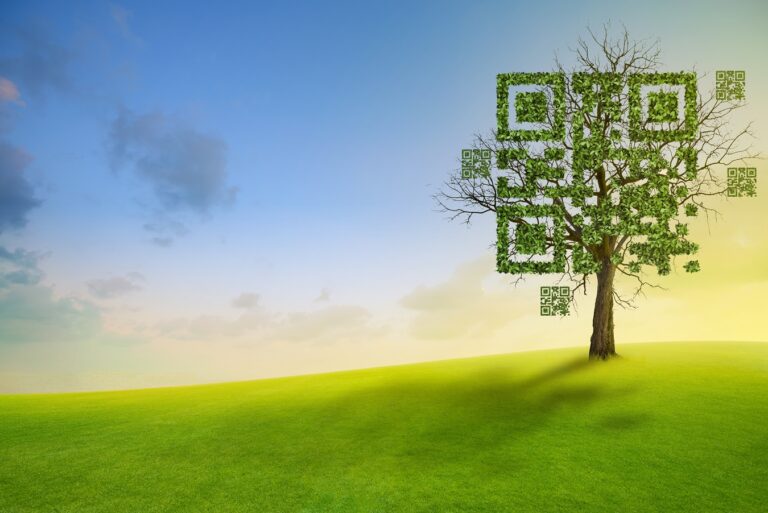In response to these environmental challenges, the fashion industry is leveraging technology to drive change. One innovative solution is to create a QR code that enables consumers to access detailed information about a product’s sustainability credentials with a simple scan. This transparency empowers shoppers to make environmentally responsible choices and encourages brands to prioritize eco-friendly practices throughout their supply chains. In the face of such alarming statistics, the quest for sustainability has become more urgent than ever. Enter QR codes, the unassuming squares of black and white pixels that are revolutionizing the way we interact with our environment. From product packaging to agricultural labels, QR codes are sprouting green initiatives across industries, empowering both consumers and organizations to make informed, eco-conscious decisions.
Transparency and sustainable shopping
QR codes on product packaging serve as gateways to a wealth of information about a product’s environmental impact. By scanning these codes, consumers gain insights into the product’s lifecycle – from sourcing raw materials to manufacturing processes and recycling information. Moreover, QR codes connect shoppers with educational resources, enlightening them about sustainable consumption practices and ethical brands. Armed with knowledge, consumers wield immense power in driving demand for eco-friendly products and holding companies accountable for their environmental footprint.
In addition to QR codes, here are some other ways consumers can promote transparency and sustainability while shopping:
- Research: Before making a purchase, take some time to research the brand and its practices. Seek out certifications or labels that signify adherence to sustainable methods.
- Support local: Buying from local producers reduces the carbon footprint associated with transportation and supports local economies.
- Minimal packaging: Choose products with minimal packaging or packaging made from recyclable materials to reduce waste.
- Reusable products: Opt for reusable products over single-use items whenever possible to reduce landfill waste.
- Fair trade: Support fair trade products, which ensure fair wages and working conditions for producers in developing countries.
- Vote with your wallet: Support companies that prioritize sustainability and ethical practices by purchasing from them and avoiding those that don’t.
- Community engagement: Get involved in local sustainability initiatives and advocate for transparency in consumer goods.
By incorporating these practices into their shopping habits, consumers can contribute to a more transparent and sustainable marketplace while making informed choices about the products they buy.
QR codes for waste reduction and recycling
In the battle against waste, QR codes emerge as powerful allies. They adorn product packaging, offering concise instructions on proper disposal and recycling methods. Gone are the days of confusion over whether to toss a plastic container in the recycling bin or trash. With a simple scan, consumers are equipped with the knowledge needed to minimize waste and maximize recycling efforts. Furthermore, QR codes unlock access to interactive platforms, enabling users to locate nearby recycling facilities and participate in waste reduction programs with ease.
Promoting sustainable practices in agriculture
In the realm of food production, QR codes serve as conduits of transparency and trust. When affixed to food labels, these codes unveil the journey from farm to table, showcasing sustainable farming practices and forging connections between consumers and local farmers. By scanning a QR code, shoppers gain insight into food provenance and can make informed choices, supporting ethically sourced produce and reducing their carbon footprint.
Engaging citizen science and environmental monitoring
Environmental stewardship is a collective endeavor, and QR codes facilitate citizen engagement like never before. Embedded in environmental signage, these codes beckon citizens to join in citizen science initiatives and contribute to data collection projects. Whether it’s tracking water quality or monitoring wildlife populations, QR codes serve as portals to environmental education and action. Moreover, they empower communities to address local environmental issues and foster a sense of stewardship for the world around them.
QR codes for sustainable events and green initiatives
Events, both big and small, present opportunities for sustainable practices, and QR codes play a pivotal role in amplifying these efforts. At eco-friendly events, QR codes disseminate information on waste reduction strategies, promote the use of reusable containers, and encourage sustainable transportation options. Additionally, QR codes streamline the ticketing and registration process, ushering in an era of paperless events that prioritize environmental conservation.
Innovation and collaboration
As technology continues to evolve, so too will the applications of QR codes in environmental initiatives. Imagine a world where created QR codes on platforms like ME-QR are seamlessly integrated with augmented reality, offering immersive experiences that inspire conservation action. Yet, realizing this vision requires collaboration on a global scale. Businesses, governments, and environmental organizations must join forces to harness the full potential QR codes for environmental impact. By joining forces, we can pave the way for a greener, more eco-conscious tomorrow that will benefit generations yet to come.
In the digital age, QR codes stand as symbols of hope in the fight against environmental degradation. They bridge the gap between technology and environmental action, empowering individuals and organizations to make meaningful contributions to sustainability. As we scan and grow, let us not underestimate the power of a simple QR code to catalyze change. So, I urge you, dear reader, to take action today. Scan the QR codes and embark on a journey towards a more sustainable tomorrow. Together, we can turn the tide in favor of our planet and all who call it home.


